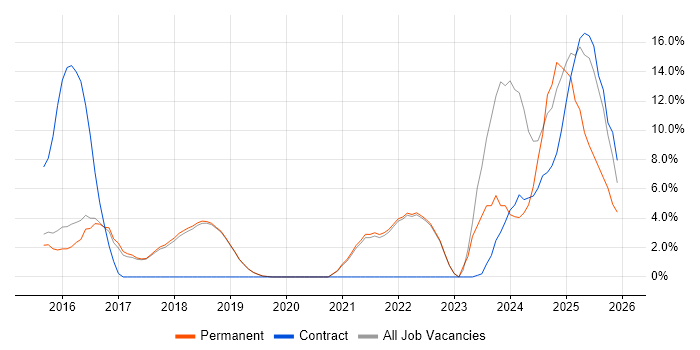Behaviour-Driven Development (BDD)
West Sussex > Burgess Hill
The table below provides summary statistics for permanent job vacancies advertised in Burgess Hill requiring BDD skills. It includes a benchmarking guide to the annual salaries offered in vacancies that cited BDD over the 6 months leading up to 22 May 2025, comparing them to the same period in the previous two years.
|
|
6 months to
22 May 2025 |
Same period 2024 |
Same period 2023 |
| Rank |
8 |
14 |
- |
| Rank change year-on-year |
+6 |
- |
- |
| Permanent jobs citing BDD |
4 |
2 |
0 |
| As % of all permanent jobs advertised in Burgess Hill |
16.00% |
4.44% |
- |
| As % of the Processes & Methodologies category |
16.67% |
6.90% |
- |
| Number of salaries quoted |
1 |
1 |
0 |
| Median annual salary (50th Percentile) |
£70,000 |
£70,000 |
- |
| West Sussex median annual salary |
£70,000 |
£57,500 |
£57,500 |
| % change year-on-year |
+21.74% |
- |
-8.00% |
BDD falls under the Processes and Methodologies category. For comparison with the information above, the following table provides summary statistics for all permanent job vacancies requiring process or methodology skills in Burgess Hill.
| Permanent vacancies with a requirement for process or methodology skills |
24 |
29 |
9 |
| As % of all permanent jobs advertised in Burgess Hill |
96.00% |
64.44% |
81.82% |
| Number of salaries quoted |
19 |
10 |
0 |
| 10th Percentile |
£33,500 |
£23,000 |
- |
| 25th Percentile |
£45,875 |
£33,000 |
- |
| Median annual salary (50th Percentile) |
£65,000 |
£55,000 |
- |
| Median % change year-on-year |
+18.18% |
- |
- |
| 75th Percentile |
£71,250 |
£70,000 |
- |
| 90th Percentile |
£74,000 |
- |
- |
| West Sussex median annual salary |
£53,500 |
£55,000 |
£55,000 |
| % change year-on-year |
-2.73% |
- |
- |

